Portière
A portière is a hanging curtain placed over a door or over the doorless entrance to a room. Its name is derived from the word for door in French: porte.
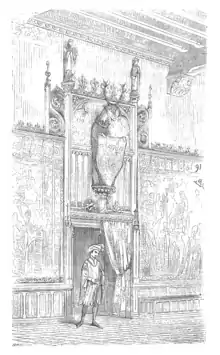
History
From Asia, it came to Europe at a remote date. It is known to have been in use in Europe in the 4th century, and was probably introduced much earlier.[1] Like so many other domestic plenishings, it reached England by way of France, where it appears to have been originally called rideau de Porte (literally, "door curtain").
Common in wealthier households during the Victorian era, it is still occasionally used either as an ornament or as a means of mitigating draughts. It is usually of some heavy material, such as velvet, brocade, or plush, and is often fixed upon a brass arm, moving in a socket with the opening and closing of the door.
Rising portière
A rising portière is a simple but effective mechanism. It is fastened to both the door and to the wall near the hinge, such that the rail raises itself when the door is opened. This allows the curtain to be long enough to seal against the floor and contain draughts, but not drag on the floor or catch under the door when the door is opened.[2] Rising portières come in different configurations to seal the curtain against different door surrounds.[3]
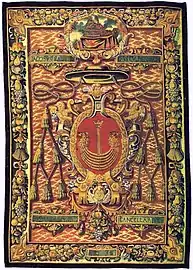 Heraldic portière of Jakub Zadzik, Bishop of Cracow, wool, silk, silver and gold, circa 1633
Heraldic portière of Jakub Zadzik, Bishop of Cracow, wool, silk, silver and gold, circa 1633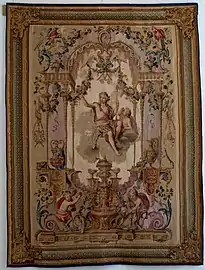
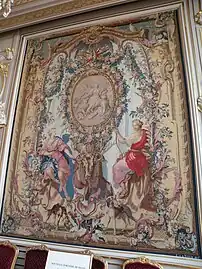 New portière of Diane, hung as a wall tapestry, Pierre Jose Perrot, 1700s
New portière of Diane, hung as a wall tapestry, Pierre Jose Perrot, 1700s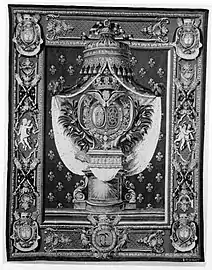 Portière with the Chauvelin arms from a set called a Chancellerie, wool and silk, designed 1679 and 1700, borders ca. 1720, woven 1728–30
Portière with the Chauvelin arms from a set called a Chancellerie, wool and silk, designed 1679 and 1700, borders ca. 1720, woven 1728–30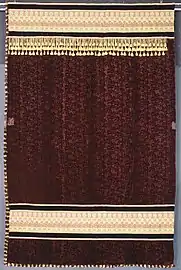 Portière showing draft-excluding fringe on two sides, silk velvet, cotton, wool, circa 1878–80
Portière showing draft-excluding fringe on two sides, silk velvet, cotton, wool, circa 1878–80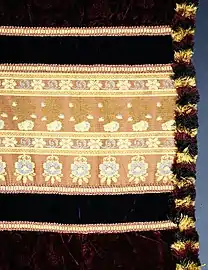 Close-up of draft-excluding fringe
Close-up of draft-excluding fringe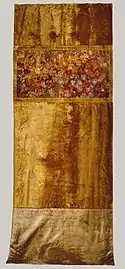 Silk velvet, and silk appliquéd and embroidered with silk and wool, silk damask, circa 1883
Silk velvet, and silk appliquéd and embroidered with silk and wool, silk damask, circa 1883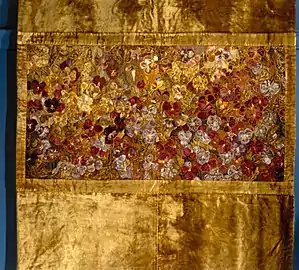 Close-up of appliquéd panel
Close-up of appliquéd panel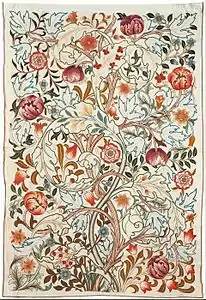 Acanthus portière, Morris and Co., silk embroidery on linen, 1890s
Acanthus portière, Morris and Co., silk embroidery on linen, 1890s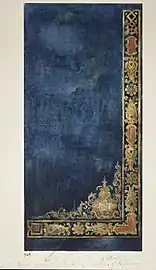 Design for a portière by Louis Comfort Tiffany, circa 1890–1902
Design for a portière by Louis Comfort Tiffany, circa 1890–1902
See also
- Noren (less insulating door curtain)
Notes
- Smith, William, ed. (1870). "Velum". Dictionary of Greek and Roman Antiquities (2nd ed.). Boston: Little, Brown, & Co. pp. 1185–1186.
- "Portiere Rods and Interlined door curtains".
- http://www.tracksandpoles.com/rods-wire-tracks/rods/portiere-door-rods.html
References
This article incorporates text from a publication now in the public domain: Chisholm, Hugh, ed. (1911). "Portière". Encyclopædia Britannica (11th ed.). Cambridge University Press.